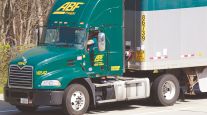Car Haulers Finally Ratify Labor Pact; Carriers Switch to Pursuing New Deals

This story appears in the April 10 print edition of Transport Topics.
After 19 months in the limbo of working without a contract, Teamsters union members in the car-haul sector ratified a new labor pact with a resounding 86% yes vote, providing labor stability through May 2021 for unionized motor carriers that move cars and trucks.
Approval was announced by the International Brotherhood of Teamsters on March 30, and the contract covers about 5,000 drivers, maintenance technicians, yard workers and office personnel employed by seven companies.
Employees also approved the Central-Southern supplement with an 84% yes vote, the union said.
The new terms went into effect the week of April 2 and include a back-pay settlement of $1,600 per worker for additional compensation dating to Sept. 1, 2015, the expiration of the old contract. Union members in 2015 and 2016 had voted down two contracts negotiated by union leadership with the National Automobile Transporters Labor Division, the management group.
Eastern and Western supplemental agreements were approved in 2016.
“These have been tense and trying times for the last 18 or so months,” said Michael Riggs, CEO of Jack Cooper Holding Corp., the largest member of NATLD.
“Now we can go to work on putting in bids for new business and getting back to winning awards from our customers. … We’re very happy,” Riggs said.
“The negotiations have been a long and difficult process, but in the end, we negotiated an agreement that met the two top goals of our membership: traditional wage increases and maintaining our members’ top-tier health and pension benefits,” Kevin Moore, director of the car-haul division, said in a Teamsters statement.
“In the end, we achieved a balanced settlement that protects historical benefits enjoyed by our skilled Teamsters but also will give the unionized side of auto and truck transporters a chance to grow in the future,” Moore added.
The national agreement provides for health, welfare and pension contributions to maintain benefits. It also provides for wage increases of between 30 and 45 cents per mile in each of the next five years. In addition, all current “new business” rates will be increased by 6% and then by 3% each year going forward.
Although the negotiations were tough and even “painful,” Riggs said that makes the ratification especially “sweet.” Car-haul drivers have a particularly tough job, he said, because they have to make sure their rigs meet height and weight requirements and assist in loading and unloading very expensive freight — new cars.
At Jack Cooper, Riggs said, annual driver turnover is less than 10%, a small sliver of the 100% churn rate often found among dry van truckload carriers.
“It would be a nightmare if we had 100% turnover. We have some exceptional talent out there in the field,” he said.
The two largest unionized members of NATLD are Jack Cooper, No. 42 on the Transport Topics Top 100 list of the largest U.S. and Canadian for-hire carriers, and Cassens Transport, No. 72.
Other members include Active Truck Transport of Pleasant Prairie, Wis., which delivers new trucks by pulling them in a saddle-mounted fashion, and RCS Transportation of Simpsonville, Ky., which provides support services related to the intermodal transportation of cars.
James Osmer is the executive director of NATLD, for which he has worked since 1983. The Troy, Mich., attorney said he has been through seven contract cycles.
“I think both sides are pleased with the length of this latest deal. It will provide labor stability through 2021, and that’s an important aspect,” he said.
Osmer said the delays in contract approval coincided with the election campaign for union president. President James Hoffa won re- election over challenger Fred Zuckerman in November.
“The first two times around, the agreements we negotiated faced IBT opposition that was part of the overall IBT political climate,” Osmer said.
He also praised his counterparts in the car-haul division for persistence and a “concentrated effort to get a contract,” adding that the labor side recognizes the intensely competitive nature of the car-haul sector of trucking.
The agreement comes at a critical time for car haulers as business appears to be dipping. Since 2011, U.S. new car sales, which are measured monthly, have generally been on the rise.
2015 and 2016 were very strong years, with U.S. sales of cars and light trucks topping 17 million in both years. December may have been a peak, though, with an annualized rate of 18.3 million that has declined to 16.5 million in March.
Riggs said auto sales can be very fickle, and projections can change suddenly, especially if tax rates and/or interest rates change, “but flat to down for this year is the current consensus” for sales.




